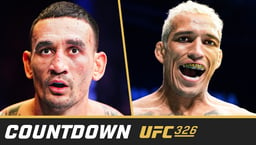
Issue 132
September 2015
We’ve all lambasted judges following tight fights, but are we right to do so? One international adjudicator gives FO the official’s side of the story.
By Ben Cartlidge
MMA judge for promotions
including the UFC, KSW and
Cage Warriors since 2010
You only usually hear your surname when you’re in trouble or when you’re being singled out, and that never quite rings as true as when you’re judging fights. On a recent trip to Poland, I’d just finished judging a back-and-forth bout when I noticed the process of informing the announcer of the scores was taking longer than usual.
I sat and waited for what seemed like an age before the silence was broken and the scores were read out. I can’t speak Polish, more than to say hello or thank you, so when the announcer eventually started up, I was none the wiser. But then words echoed around the arena that I was half expecting: “Judge Cartlidge...”
Whenever you hear your name as a judge it means there’s been a difference of opinion. It serves to separate the verdicts and attach each scorecard to the individual official.
It reinforced what I’d thought initially when I sat back and waited for the scores to be tallied. This was a close fight with a lot of fast-paced action, competitive striking and good scrambles from both competitors.
Despite the difference in opinion, however, the verdict in question wasn’t a robbery. Because when you break most fights down, very few are. Often after a close fight happens, fight fans will message me through social media to ask what my judgment was, but it always has to come with a caveat.
If I’m not in attendance to judge the fight live, then my opinion is going to be conditioned and colored by a colossal factor that sits outside my control. I have to accept the view that the production team gives me. I’m not sitting at the side of the cage with my notepad and pen in hand, I’m sitting on my sofa with a cup of coffee.
If I’m not working at the event, then I’m watching the action on TV and the mindsets required for both are completely different. As a judge, your central focus is to hold your attention in one place for five-minute intervals. Looking away for even a split second gives you a view of the round based not on its entirety, but on the percentage that you’ve seen.
Scoring a fight and watching a fight are two completely different perspectives, which really questions the validity of anyone who screams the ‘r’ word when they don’t agree with a specific decision.
The next time you’re watching a fight and you don’t agree with the score, try and look at your own circumstances before taking your crusade to the world. Ask yourself:
- Were you watching this fight objectively without having a personal favorite?
- Were you able to replicate judging conditions throughout the fight and able to mentally switch off from all possible distractions?
- Were you able to view the process analytically rather than from a spectator’s point of view, and ignore the input from the commentary team, friends, pets or your cellphone?
If you can’t definitively answer ‘yes’ to these three questions then there’s no way you can be 100% sure the decision you’ve made is rational and based on every available fact. It’s not a robbery if you don’t agree with the decision, it’s not a robbery if Twitter doesn’t agree with the decision and it’s certainly not a robbery if the guy you backed lost a close fight.
That 60 seconds spent in the clinch against the cage when you checked your phone may not have been to your taste, but it accounted for 20% of the round. It’s akin to asking someone to bake you a cake but not giving them all the ingredients.
So, the next time you draw for your smartphone after a blown accumulator has left you with an axe to grind, remember that it’s perfectly natural to disagree with decisions. The interpretation of a set of criteria is always going to produce different results based on a number of factors, especially in a sport as fast paced and diverse as mixed martial arts.
When is a robbery actually a robbery? When it involves masks, guns and a getaway car. Everything else is usually always far closer upon further inspection.
...









